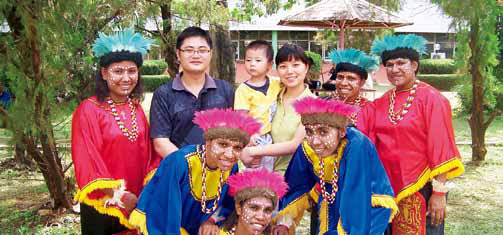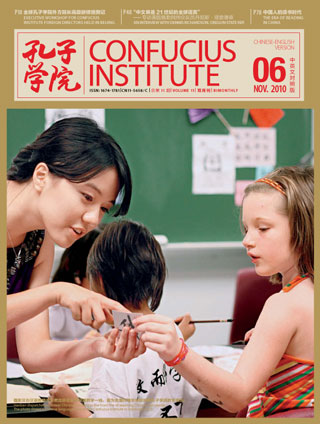

Wang Minfeng (Indonesia): “Happily guarding a hope”
Wang Minfeng (Indonesia): “After studying Chinese in Indonesia for a period of time, many of the students will go to China for further study. Th eir attitude towards learning while living in China has been encouraging to me”.
Currently there are over 4,000 Chinese language teachers and volunteers teaching Chinese in Confucius Institutes, primary and secondary schools and universities throughout the world. While spreading Chinese language and culture, these cultural envoys personally experienced exchanges and interactions with different teaching practices and other cultures. The column of Teachers’ Voices is a channel where Chinese language teachers and volunteers can share their teaching experience with each other. There will also be a collection of stories on their unique experiences in foreign lands these cultural envoys can share with our readers.
Wang Minfeng, teacher of the Chinese Department at Christian University of Indonesia
After centuries of precarious vicissitudes, Chinese teaching in Indonesia has entered a new period of development: Chinese is being studied by an increasing number of Indonesian students now including not only those of Chinese descent but also young people of local ancestry.
In 2008, Hanban sent me to Indonesia to teach at the Chinese Department of Christian University of Indonesia. The university is situated among aboriginal communities, and the main purpose of its Chinese department is to teach Chinese to the local young people and train them to be local teachers of Chinese. Since the majority of the students will eventually become young teachers of Chinese in Indonesia, my job as a teacher is really to happily guard a hope.
Since most of my students live far from Jakarta, either in its suburbs or in neighboring cities, it usually takes them one to two hours to get to class by car. However, this “arduous journey” has not in the least compromised their passion for learning Chinese. The vast majorities of these students get up at five o’clock in the morning and spend a few hours on the road in order to study Chinese at the university – a routine that lasts several semesters. What touches me is not only the hardship of their commute, but also the pressure under which they prepare for each exam. Every time an exam is about to start, the students sit quietly in their seats with their heads lowered and eyes closed, perhaps saying their religious prayers. To me, a teacher of Chinese from China, this is a solemn sight. It makes me feel that they care a lot about their Chinese performance and that Chinese has become an important part of their lives.
After studying Chinese in Indonesia for a period of time, many of the students will go to China for further study. Th eir attitude towards learning while living in China has also been encouraging to me. One of the students was in poor health and had been under constant medical care. She had a hard time adjusting to life in China and often became ill. The student’s mother, very worried about her daughter’s life abroad, wanted her to come back to receive treatment. However, the daughter replied: “Mother, I will take better care of my health. I don’t want to go back. I came to China to study; so, mother, you’ve got to cheer me up.” Seeing the student so devoted to Chinese and so fond of China, I, a teacher of Chinese, felt happy and satisfied from the bottom of my heart.

In order to train the students to become qualified teachers of Chinese, we put a lot of emphasis on maintaining a normal-university style curriculum, from its formulation to implementation of teaching plans. From time to time, we change our teaching strategies and improve our teaching methodologies so that the students can learn more teaching methodologies and build their teaching skills while learning Chinese. In addition, every semester we have an activity called “Walk to the Teacher’s Platform”, during which each student teaches the class and then has his or her performance discussed and evaluated by the whole class so that they can improve. The students go to great lengths preparing for this activity: they formulate teaching plans, prepare teaching aids, develop classroom activities, and spell out the specific components of their lesson. They are so serious about this activity that it is as if they had already become teachers. In order to boost their passion for Chinese, we also organize many activities for experiencing Chinese culture: making zongzi during Dragon Boast Festival, tasting mooncakes during Mid Autumn Festival, making dumplings during Spring Festival, hanging lanterns and solving riddles during Lantern Festival … with great care, we foster their love of Chinese.
In a not-so-distant future, these students will all have learned Chinese well and become Chinese teachers themselves. at day will be the day that fulfills the hope that I have been guarding.
 Published in Confucius Institute Magazine
Published in Confucius Institute MagazineNumber 11. Volume VI. November 2010.
View/Download the print issue in PDF










.png)













No hay comentarios:
Publicar un comentario